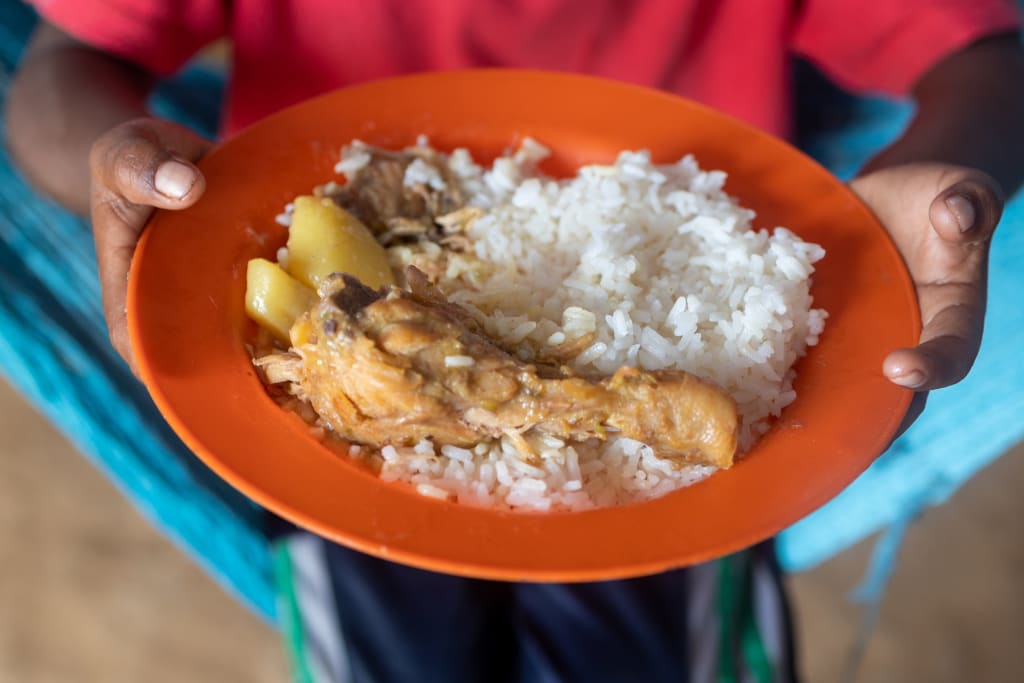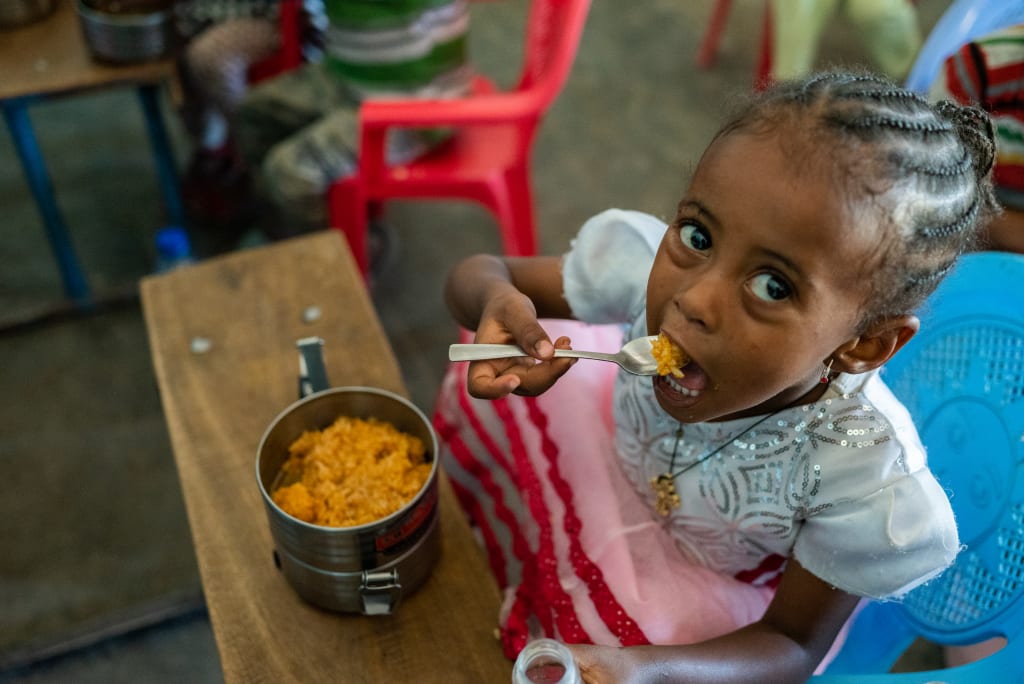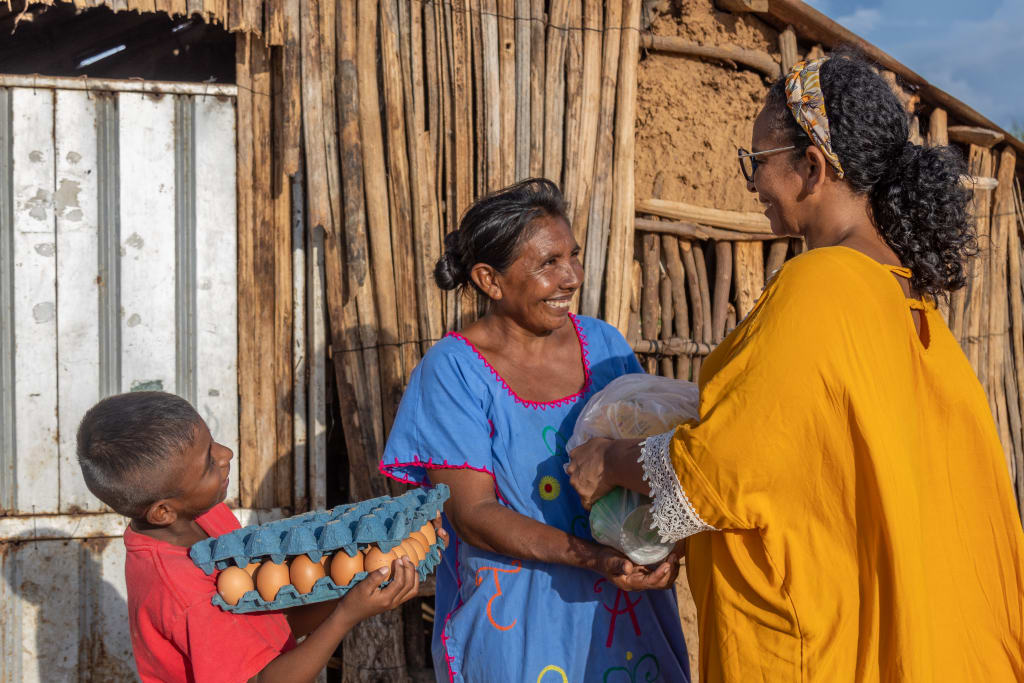The news can be scary for kids (and grown-ups too)! With so much brokenness in the world, it’s tempting to want to shield our children. Many of us wonder how to make our children aware of complex issues like the global food crisis. Heavy conversations can be intimidating.
Right now, a global food crisis is affecting regions of the world to a degree we haven’t seen in decades. Even at home, most Canadians are adjusting spending habits or noticing disruptions to their normal food availability or quality.
This is a challenging conversation for everyone to different degrees. But for those of us with kids in our lives, the global food crisis can be an opportunity to share God’s heart and have important discipleship conversations.
A better way to talk with our kids about global need
As a child, were you ever told to finish your vegetables because there were starving children far away? We know that raising compassionate children who are kind, resilient and justice-seeking means that we can’t pretend everything in the world is as it should be.
But we might be cautious about making our kids afraid or causing them to feel guilty for what they do have. If you’re looking for a better way to talk about the global food crisis with your kids, we’ve created this set of resources just for you.
So what do we say to kids? And how do we say it?
Here are three ideas, along with resources, to get you started!

1. Talk about food
Understanding why the global food crisis is such a big deal starts with having a good understanding of the importance of food. It’s so much more than just fuel for our bodies. Food is a way we express culture, connect with others and care for our families. Food access affects our physical, psychological and emotional well-being. It is a gift from God, but also a gift that is meant to be shared.
Engage in family devotions.
As a family, take five days to read through our fun “Dinner Table Devos” Bible reading plan on YouVersion. It explores the good gift that food is, along with activity pages, fun food challenges and Bible discussion questions. You can find it on the Bible App or download a PDF version here.
Make a meaningful mess.
Cook some recipes from other countries together! Talk about how we can be connected to others far away through food. We can learn about cultures and celebrate how God made people all over the world unique. Check out this page for some great kid-friendly global food recipes!
Take a look— it’s in a book!
Reading age-appropriate books is a great way to start a conversation about a topic! Select some books from your local library to read together in order to start a conversation about the effects of the food crisis here and around the world. Ask your local librarian for suggestions, or try one of these:
- Maddi’s Fridge by Lois Brandt
- The Good Garden: How One Family Went from Hunger to Having Enough by Katie Smith Milway
- Mama Miti by Donna Jo Napoli
- Poverty and Hunger by Louise Spilsbury
- How to Make a Better World: For Every Kid Who Wants to Make a Difference by Keilly Swift

Bahre lives in Ethiopia and eats a delicious meal provided by her local Compassion centre.
2. Talk about the world
Helping children to understand that they are part of a global community starts with many little conversations spread out over time. As children grow, we can help them to have empathy and understand how their actions affect others. We can help grow their compassion also by helping them become aware of the beautiful diversity of the world around us!
Keep yourself aware
The first thing we can do as parents and caregivers is educate ourselves about the reality of the global food crisis (you can get an overview here, download a global food crisis prayer guide, or sign up to receive monthly prayer updates from the regions where we serve.)
Grow a global perspective
Secondly, let your children hear you talk about the global food crisis and other important things happening in other parts of the world. Children notice what makes us stop and pay attention. And they will see us care about what someone far away is facing. Talk about international ministries, missionaries or places you have travelled with positivity, or even international sports or advancements in science. Above all, pray for countries of the world, especially those who face serious hunger and scarcity.
Make it personal
Thirdly, we can talk about the places your friends and neighbours, classmates and teammates come from. Invite these friends or other people to your home – newcomers to Canada, friends who have recently been on a trip, international workers or missionaries. Talk about the places your family came from and your own cultural heritage. Learn together about festivals, languages and cultural foods from faraway places. Help kids see that they already have connections to people around the world!
Things are not always fair
Kids need to know there is food for everyone to have enough, but food doesn’t always get where it needs to go. Or an environmental disaster happens, and the food people plant doesn’t grow. Things are not always fair or equal worldwide. Once you have had these conversations, ask kids what they think should happen when some people have more, and others have less.
Learn about hunger, food insecurity and malnutrition
Lastly, we need to be precise with language. Older children can absorb more about the different realities of the world. They can learn the difference between wanting a snack and true hunger. Talk about how in a food crisis, some children and families make do with only one meal a day or sometimes have no food at all in their house. That is true hunger.
Other families are in places where food just isn’t available at the store, or they have no money to buy it. These people face food insecurity. Additionally, some children and families have food to eat, but it’s only one kind of food—like rice or tortillas. They might not feel hungry, but that food doesn’t have enough nutrition, and they can become very sick.

Santiago and his family live in Colombia, where some families lack regular access to food. They receive food support from their local church.
3. Talk about the helpers
Children’s television host Mr. Rogers is famously quoted as saying, “When I was a boy and I would see scary things in the news, my mother would say to me, “Look for the helpers. You will always find people who are helping.”
When a child is overwhelmed or afraid upon hearing about something bad, we can show them how people are helping. When the moment of intense fear is past, it is time to roll our sleeves and become helpers, too! Even when afraid, children might even have amazing ideas of ways to help if we encourage them to know the difference we can really make. Giving children the truth paired with a sense of agency for change is one of the greatest gifts we can give them!
God asks us to help
Jesus taught that we must love our neighbours. When asked ‘who is my neighbour,’ Jesus responded with a story to indicate that our neighbour is the one who is in need. Though we can’t help with every need in the world, we can choose some that are closest to our hearts and the heart of God the Father!
Read verses like these together and talk about who in the world needs our help.
- “ Speak up for those who cannot speak for themselves, for the rights of all who are destitute. Speak up and judge fairly, defend the rights of the poor and needy.” – Proverbs 31:8-9
- “Carry each other’s burdens, and in this way you will fulfill the law of Christ.” – Galatians 6:2
- “If anyone has material possessions and sees a brother or sister in need but has not pity on them, how can the love of God be in that person?” 1 John 3:17
- “Is not this the kind of fasting I have chosen: to loose the chains of injustice and untie the cords of the yoke, to set the oppressed free and break every yoke?” – Isaiah 58:6
- “Religion that God our Father accepts as pure and faultless is this: to look after orphans and widows in their distress and to keep oneself from being polluted by the world.” – James 1:27
Learn about different ways to help
Hunger and food insecurity are affecting people all around the world as well as here in Canada. Because the causes are complex, there must be many different solutions working together in order to solve the hunger problem. Learn about how organizations are helping to bring immediate relief and long-term solutions to those in desperate need of food. Find out who in your own community is helping to build food security and provide food for the hungry.
Become a local helper
As a family, select an action you can take together. Even a tiny contribution goes a long way. Here are a few ideas:
- Go grocery shopping together and select items that would make a meal to donate to a local food bank
- If you have a vegetable garden, see if your local food bank offers a program for you to grow an extra row. Donate the fresh produce to be distributed to those who need it. Additionally, try growing some of your own food if you are able. You can even grow herbs indoors in your kitchen or lettuce on an apartment balcony. When they grow it themselves, children gain appreciation for the effort and time it takes to grow the food they love.
- Find out if a local school or family shelter needs school snacks or breakfast foods for a local distribution program. Consider a commitment as a family that is within your means to donate something monthly.
Become a global helper
The most serious effects of the global food crisis are felt in places far from Canada where few local supports exist, and drought or war decimates food availability. Compassion enables local churches in partner countries to bring relief and build resiliency to their communities in the name of Jesus. Here are a few ways your family can partner with Compassion:
- Give a Gift of Compassion. Firstly, your family could make an impact by giving a gift that helps a family’s stability— gifts like emergency food packs or a meal for a family.
- Sponsor a child. Secondly, consider making a longer-term impact. Children sponsored through Compassion receive monitoring for health and malnutrition, and their family can receive food support when needed. Supporting children long-term helps them to thrive, learn and change their communities in the future.
- Raise awareness. Finally, tell others about what you’ve learned about the global food crisis on social media or in your church. Share links to what Compassion is doing like this story about food gardens in Nicaragua or how food is distributed in Bangladesh.
Every day at Compassion, we see children changing their communities and finding solutions that bring hope and restoration to the world.
What children need is a little education, support, and some hope that things can really change. We invite you to take the difficult step to talk about the global food crisis. When our children all see that they can be part of real change, nothing will be out of reach for the next generation!
Share with others how they can have conversations about the
global food crisis with their kids, too!





